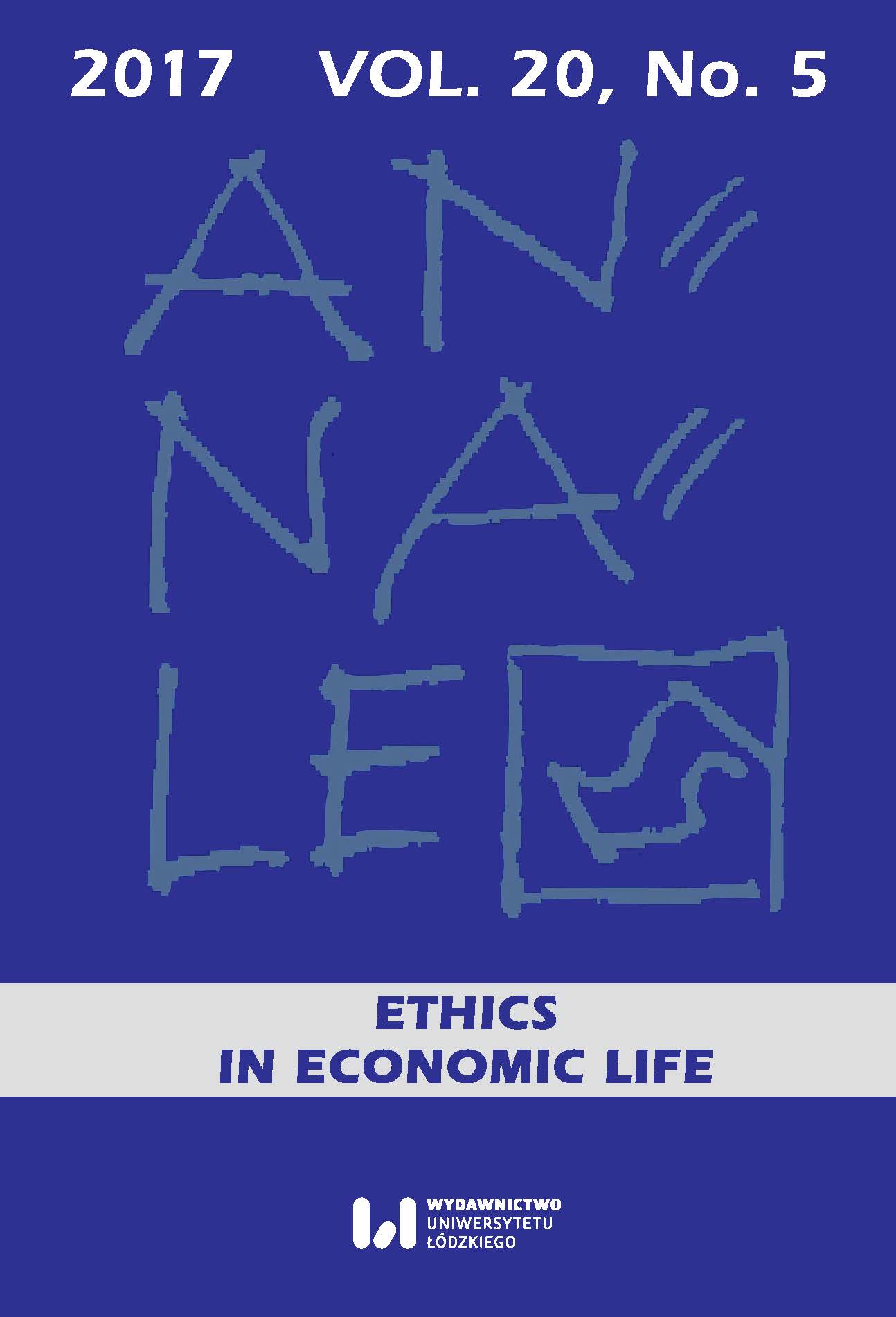The marginal morality (die Grenzen der Moral) as an ethical challenge and as the knowledge on how to gain competitive advantage
DOI:
https://doi.org/10.18778/1899-2226.20.5.02Słowa kluczowe:
marginal morality, corporate social responsibility, competitive advantageAbstrakt
The aim of this article is to scrutinize the relationship between the moral attitude of an entrepreneur and his or her possibility to gain competitive advantage. This declaration leads to the following question: does the everyday practice confirm or deny the economic usefulness of the postulate of corporate social responsibility? On the one hand, moral desertion is obviously profitable (also in the economic sense). Partners of the deserter, in most cases, are not able to avoid (unexpected and expansive) consequences of his or her new attitude towards them. On the other hand, this strategy—in long-term perspective—seems to be doubtfully profitable. The former victims orientate themselves to their new circumstances and become ready to face the attack. Therefore, the corporate social responsibility, in the final calculation, should be taken as the only way to protect active participants of the market against the temptation to neglect their obligation towards people, who can punish or reward them (as stakeholders and whistleblowers).
Bibliografia
Banisar, D. (2011). Whistleblowing international standards and developments. A study for the First International Conference on Corruption and Transparency. http://papers.ssrn.com/sol3/papers.cfm?abstract_id=1753180
Google Scholar
Berlin, I. (1994). Cztery eseje o wolności (H. Bartoszewicz, Trans.). Warszawa: Wydawnictwo Naukowe PWN.
Google Scholar
Dylus, A. (1992). Moralność krańcowa jako problem dla katolickiej nauki społecznej. Warszawa: Pallotinum.
Google Scholar
Dylus, A. (2009). Compliance-Management. Charakterystyka i warunki powodzenia. In W. Gasparski, & J. Jabłońska-Bonca (Eds.), Biznes, prawo, etyka. Warszawa: Wydawnictwa Akademickie i Profesjonalne dla Akademii Leona Koźmińskiego.
Google Scholar
Evan, W. M., & Freeman, R. E. (1997). Spółka i osoby żywotnie zainteresowane. Kapitalizm kantowski. In L. V. Ryan, & J. Sójka (Eds.), Etyka biznesu. Poznań: “W drodze”.
Google Scholar
Foucault, M. (1998). Trzeba bronić społeczeństwa (M. Kowalska, Trans.). Warszawa: Wydawnictwo KR.
Google Scholar
Freeman, R. E. (1984). Strategic management: A stakeholder approach. Boston, MA: Pitman.
Google Scholar
Garbarski, L., Rutkowski, I., & Wrzosek, W. (2000). Marketing. Warszawa: Polskie Wydawnictwo Ekonomiczne.
Google Scholar
George, R. T., (1993). Competing with integrity in international business. New York, NY, Oxford: Oxford University Press.
Google Scholar
Hardin, R. (2009). Zaufanie (A. Gruba, Trans.). Warszawa: Sic!
Google Scholar
Kuciński, K. (2002). Gospodarka globalna. Poznań: Kurpisz.
Google Scholar
Lévinas, E. (1991). Etyka i Nieskończony (B. Opolska-Kokoszka, Trans.). Kraków: Wydawnictwo Naukowe PAT.
Google Scholar
Lewicka-Strzałecka, A. (1999). Etyczne standardy firm i pracowników. Warszawa: Wydawnictwo IFiS PAN.
Google Scholar
Lewicka-Strzałecka, A. (2005). Moralne standardy konsumentów: analiza empiryczna. Annales. Ethics in Economic Life, 8(1), 75–86.
Google Scholar
Lewicka-Strzałecka, A. (2006). Odpowiedzialność moralna w życiu gospodarczym. Warszawa: Wydawnictwo IFiS PAN.
Google Scholar
Mendel, T. (2001). Partycypacja w zarządzaniu współczesnymi organizacjami. Poznań: Wydawnictwo Akademii Ekonomicznej w Poznaniu.
Google Scholar
Miceli, M. P., Near, J. P., & Dworkin, T. M. (2008). Whistleblowing in organizations. New York, NY: Routledge.
Google Scholar
Mitchell, R. K., Agle, B. R., & Wood, D. J. (1997). Toward a theory of stakeholder. Identification and salience: Defining the principle of who and what really counts. Academy of Management Review, 22(4), 853–886.
Google Scholar
Nader, R., Petkas, P., & Blackwell, K. (1972). Whistle blowing. New York, NY: Bantam Books.
Google Scholar
Rotengruber, P. (2010). Deklaracje, narzędzia, czyny. Wokół wątpliwości towarzyszących postulatowi społecznej odpowiedzialności przedsiębiorstw. In W. Gasparski, & B. Rok (Eds.), Ku obywatelskiej rzeczpospolitej. Warszawa: Poltext.
Google Scholar
Rotengruber, P. (2011). Dialogowe postawy etyki gospodarczej. Poznań: Wydawnictwo Naukowe UAM.
Google Scholar
Rotengruber, P. (2013). Moralność krańcowa jako przedmiot badania oraz jako wiedza o sposobach osiągania przewagi konkurencyjnej. Annales. Ethics in Economic Life, 16, 41–50.
Google Scholar
Sosenko, K. (1997). Kwestia zastosowania etyki w ekonomii. In J. Dietl, & W. Gasparski (Eds.), Etyka biznesu. Warszawa: Wydawnictwo Naukowe PWN.
Google Scholar
Sosenko, K. (1998). Ekonomia w perspektywie aksjologicznej. Kraków: Wydawnictwo Akademii Ekonomicznej w Krakowie.
Google Scholar
Sprenger, R. K. (2009). Zaufanie #1 (M. Dutkiewicz, Trans.). Warszawa: MT Biznes.
Google Scholar
Węgrzecki, A. (2002). Wolność i dowolność w działalności ekonomicznej. Annales. Ethics in Economic Life, 5, 15–20.
Google Scholar
Wicks, A. C., & Freeman, R. E. (1998). Organization studies and the new pragmatism: Positivism, anti-positivism, and the search for ethics. Organization Science, 9(2), 123–140.
Google Scholar
Wróbel, S. (2002). Władza i rozum. Poznań: Wydawnictwo Naukowe UAM.
Google Scholar
Žižek, S. (2001). Wzniosły obiekt ideologii (J. Bator, & P. Dybel, Trans.). Wrocław: Wydawnictwo Uniwersytetu Wrocławskiego.
Google Scholar
Pobrania
Opublikowane
Jak cytować
Numer
Dział
Licencja
Prawa autorskie (c) 2017 Annales. Etyka w Życiu Gospodarczym

Utwór dostępny jest na licencji Creative Commons Uznanie autorstwa – Użycie niekomercyjne – Bez utworów zależnych 4.0 Międzynarodowe.









